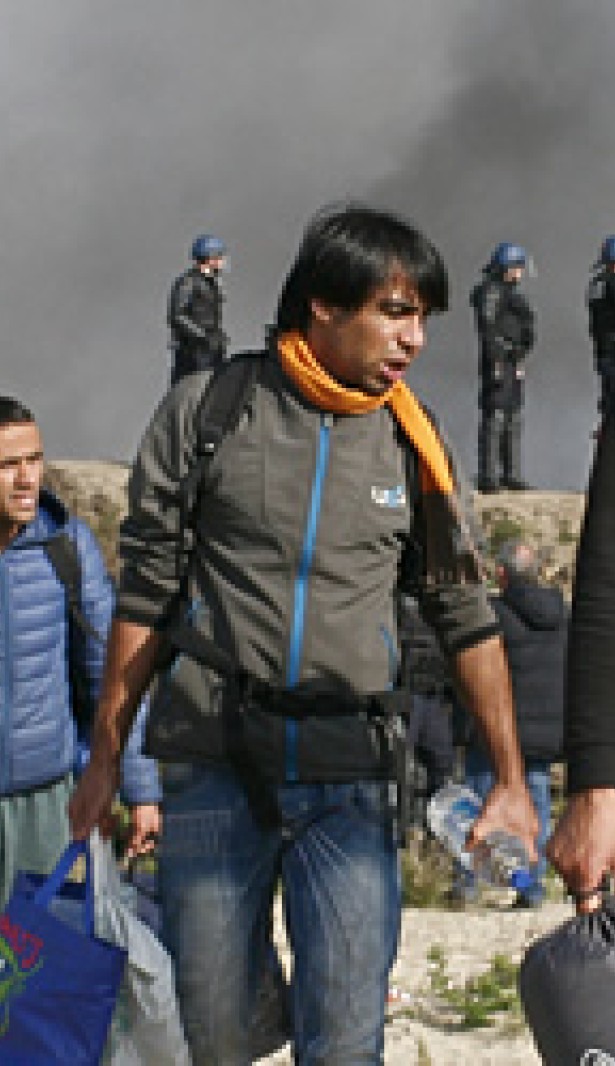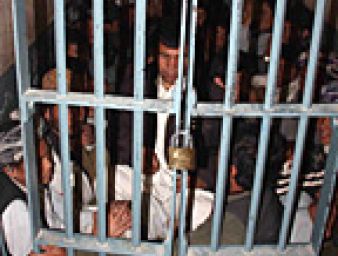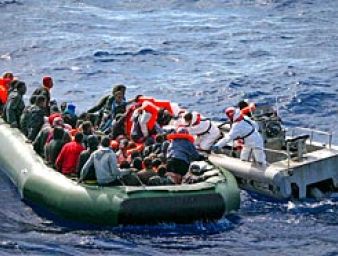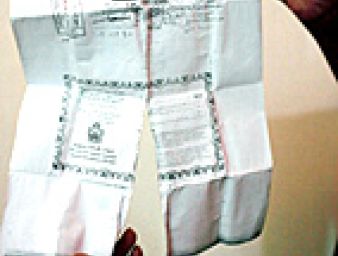Spotlight on human rights of migrants in wake of Calais camp eviction
16 December 2016
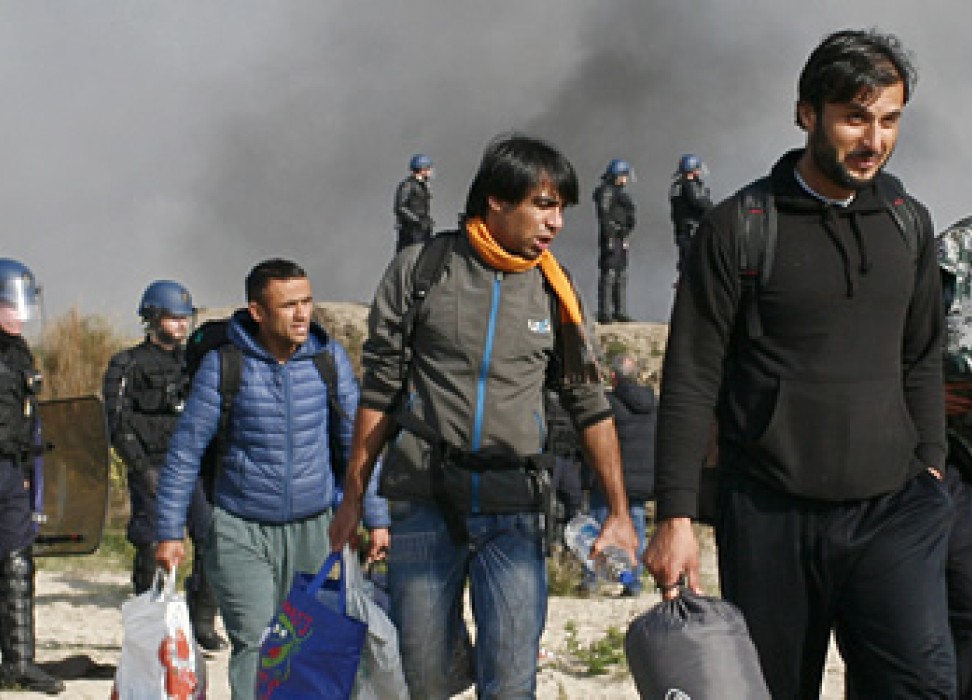
“When the border guards in Kenya tried to shoot me, I ran into the woods to escape. Then in Turkey I was thrown in prison after I was caught by officials trying to cross into Greece. Now I’m just hoping to get to the UK,” said Frezghi, 29, standing outside a tent in a makeshift camp for migrants in the countryside of northern France.
Nestled in a wooded area about 70 kilometres from the French port city of Calais, two rows of tents pitched on a muddy field provide shelter for Frezghy and about 100 other men and women, mostly from Eritrea, Ethiopia and Sudan. This is one of an unknown number of unofficial settlements where migrants have sought shelter in the country.
Declining to give his full name, Frezghy is among some 3,000 migrants from the Calais camp who have chosen to dodge the official registration process, since French authorities dismantled the Calais camp in October 2016. An estimated 5,600 inhabitants were transferred to 450 temporary shelters and reception centres around France, where they are submitting asylum claims. Like his companions he chose this site for its ideal location next to a truck stop, where he hopes to hop aboard one of the lorries bound for England.
Frezghy recounts a journey that began with a nighttime border crossing from his native Eritrea into Ethiopia, to flee his country’s obligatory military service. A recent UN human rights investigation found Eritrea’s national service system binds many conscripts to lifetime service under conditions amounting to modern-day slavery. “I love my country, but I cannot stay in the military until I die,” said Frezghy. After escaping to Ethiopia, Frezghy survived multiple border crossings – into Kenya, Uganda, South Sudan, United Arab Emirates, Turkey, Greece, Albania, Montenegro, Serbia, Hungary, Austria, Slovenia, Italy and now, seven years later, France.
It’s a story repeated countless times among migrants who have survived perilous journeys, fleeing war, persecution, poverty, discrimination, and other situations threatening their security and human rights. From here along the northern French coast, many hope to complete the final leg of their journey, across the English Channel, to the UK.
“As we’ve seen in other countries in Europe, there is a protection gap in France for migrants and refugees in transit who are seeking shelter and asylum along border locations,” said Pia Oberoi, Advisor on Migration for the UN Human Rights Office. “We’re especially concerned about the people who left the Calais ‘Jungle’ and who have gone into hiding and are now in vulnerable situations like this with little access to protection and basic services.”
Calais camp eviction
Oberoi was part of a UN human rights monitoring mission that visited France on 16-19 November 2016 to assess the human rights situation of migrants and refugees in the wake of the Calais camp closure. The mission visited a number of camps in the vicinity of Calais and heard concerns about migrants’ restricted access to legal assistance and information during the dismantlement.
“We’re very concerned about reports we’ve heard from migrants and civil society about a lack of due process during the eviction of people from the Calais camp, that there was a lack of access to legal assistance, and a general lack of information provided to migrants about where they were being sent or what their legal rights were in the context of their asylum requests,” said Oberoi.
While French authorities said leaflets were distributed among the Calais camp inhabitants to provide general information about the transfer operation, the UN mission heard reports about a lack of transparency regarding the location of the reception centres where migrants were taken and the conditions and services provided there. Government officials also noted that accredited journalists and NGO representatives were present during the dismantlement. However, a number of human rights lawyers and civil society groups reported they were denied or had restricted access to the camp during the eviction. They said this prevented migrants from getting adequate access to information, as well as legal, medical and social assistance.
Unaccompanied children
At a reception centre for unaccompanied children transferred from the Calais camp, 16-year old Qasim from Kunduz, Afghanistan, described fleeing a Taliban attack in the trunk of a car. “I left my country because of too much war. One night while we were sleeping, the Taliban came and there was shooting all around the city,” said Qasim. The eldest of three brothers, his father chose him as the one in the family to attempt the journey to England to join an uncle there. After surviving the one-year journey traveling alone – from Afghanistan to Iran, Turkey, Greece, the Former Yugoslav Republic of Macedonia, Serbia, Hungary and Germany – Qasim arrived six months ago at the camp in Calais, just a stone’s throw away from his final destination.
The UN Human Rights Office team that met with Qasim and the other boys at the centre found the boys had little information about what was happening to them and their requests to go to England. “Nothing had been explained to them, and they were waiting for a process they didn’t understand,” said Oberoi. “We’re very concerned that no effective guardians have been appointed for the children.”
The boys at the centre told the team that four of their friends had decided to leave the centre within days of arriving and had gone into hiding in the surrounding countryside, despite the freezing conditions.
The UN Human Rights Office team has urged authorities in France to ensure stronger child protection regulations, to appoint guardians for unaccompanied migrant children and to ensure all migrants are provided effective access to medical and psychosocial care, legal assistance and information about their rights.
“While we understand the challenges of this situation, we are worried that vulnerable individuals are suffering because of the lack of an effective strategy to protect migrants and asylum seekers,” said Oberoi. “We’re very concerned that what we are seeing, instead, is a desire to disperse people and make the problem disappear.”
It’s cold and damp and threatening to rain, as dusk falls on the muddy encampment, where Frezghi and his friends are huddled in their tent. As the men sip tea, there is talk of who might take their chances during the night to sneak aboard one of the trucks bound for the UK, and try their luck at yet one more border crossing.
“I’m hoping I can make it to England, or any country that will accept me,” said Frezghi, turning away as his voice broke.
16 December 2016
